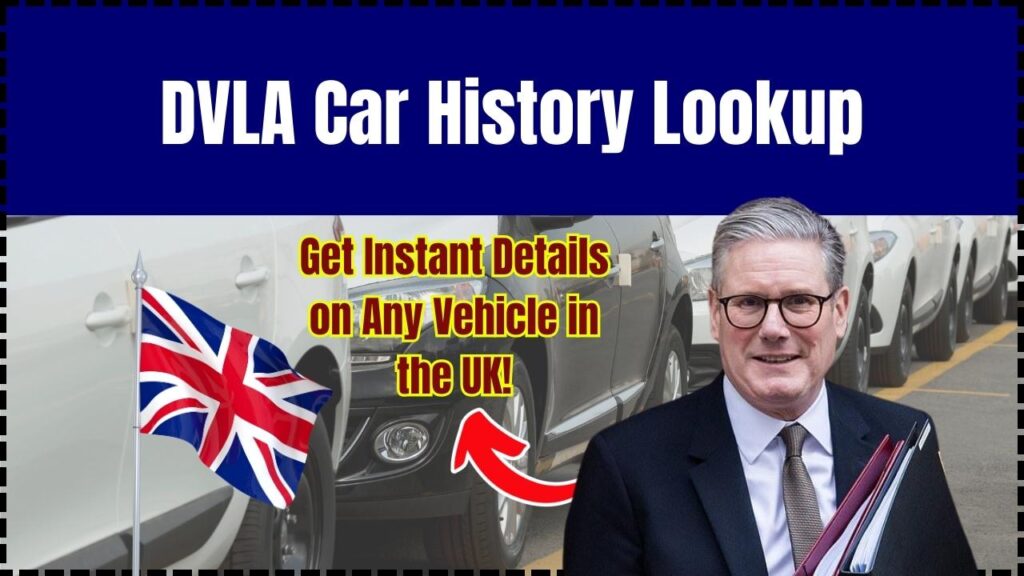DVLA Car History Lookup: Purchasing a used car can be both exciting and daunting. One of the most crucial steps in this process is conducting a comprehensive vehicle history check. In the UK, the Driver and Vehicle Licensing Agency (DVLA) provides services that allow you to access vital information about a vehicle’s past. This article will guide you through the process of performing a DVLA car history lookup, ensuring you make informed decisions when buying a used vehicle.
DVLA Car History Lookup
Doing a DVLA car history lookup is one of the smartest moves you can make when buying a used car in the UK. It’s fast, easy, and—most importantly—free. But don’t stop there. For real peace of mind, back it up with a paid third-party check to ensure the car is free from hidden problems like finance or theft. The small investment could save you thousands of pounds and a lot of headaches down the line.

| Aspect | Details |
|---|---|
| DVLA Services | Provides free online access to basic vehicle details such as tax status, MOT status, date of first registration, engine size, and CO₂ emissions. DVLA Official Website |
| Third-Party Services | Offer comprehensive reports including outstanding finance, insurance write-offs, mileage discrepancies, and stolen vehicle status. Examples: HPI Check, AA Vehicle Check, MyCarCheck. |
| Benefits | Ensures the vehicle is legally compliant, safe to drive, and free from hidden issues. Reduces risk in private car purchases. |
| How It Works | Enter the vehicle’s registration number on the DVLA website or a third-party platform to retrieve the report. |
| Professional Tip | Always compare both DVLA and third-party data before committing to purchase a used vehicle. |
What Is the DVLA Car History Lookup?
The DVLA car history lookup is a free online tool provided by the UK government that allows anyone to check essential information about a vehicle registered in the UK. Whether you’re buying, selling, or just curious about a car’s background, this tool is a crucial resource.
What you’ll find in a DVLA lookup:
- Vehicle tax status and expiry
- MOT status and full test history
- Registration date and vehicle age
- Engine size and fuel type
- CO₂ emissions and environmental rating
- Colour, make, and model confirmation
Why Car History Checks Matter?
Let’s say you find a sleek-looking car listed online for a great price. But before you get excited, imagine this: that same car has unpaid finance, has been written off in an accident, or worse—reported stolen. That’s not just a risk—it could become your legal and financial nightmare.
A car history check protects you from:
- Buying stolen vehicles – which can be confiscated by authorities.
- Taking on someone else’s finance debt.
- Overpaying for a write-off.
- Driving a car that’s not roadworthy or taxed.
Third-Party Car History Checks: What More Do They Offer?
While the DVLA offers a free lookup service, third-party providers like HPI Check, Instant Car Check, and AA Vehicle Check dive much deeper. These services provide critical information not available through the DVLA.
What they include:
- Outstanding finance and loan agreements
- Write-off categories (A, B, S, N)
- Stolen vehicle status (via police database)
- Import/export status
- Mileage discrepancies (clocking)
- Number of previous owners
- Scrappage and salvage records
These checks usually range from £2 to £20 per report, depending on depth
How to Conduct a DVLA Car History Lookup (Step-by-Step)
Step 1: Gather Information
- Vehicle registration number (number plate)
- Optional: Vehicle Identification Number (VIN) for deeper checks
Step 2: Use the DVLA Website
- Go to DVLA lookup tool
- Enter the number plate
- View basic information like MOT, tax, and specs
Step 3: Use a Third-Party Check (Recommended)
- Visit a trusted provider’s website
- Input the same registration number (and VIN, if needed)
- Pay for the report
- Review the complete history report
Step 4: Review the Results
Look out for:
- Inconsistent mileage
- Write-off records
- Finance or logbook loan alerts
- Stolen vehicle flag
- Suspicious number of past owners
Step 5: Make Your Decision
- All clear? Great—proceed with confidence.
- Something seems off? Ask the seller for clarification or walk away.
Real-World Example
Imagine buying a 2018 Ford Focus listed at £7,000. You run a DVLA check and find the MOT history looks normal. But a paid HPI check reveals it’s a Category S write-off—previously damaged structurally in an accident but repaired.
Now, you can:
- Negotiate a better price
- Walk away to avoid future risk
- At least make an informed decision
Common Mistakes to Avoid
- Relying only on DVLA data – it’s free but limited.
- Skipping checks for low-priced deals – too good to be true often is.
- Not verifying VIN numbers – important to spot cloned vehicles.
- Ignoring mileage discrepancies – a sign of odometer tampering.
Government Offering £150 Free Grocery Vouchers – See If You Qualify!
DVLA Database Reveals Shocking Facts About Your Vehicle—Check Now!
DVLA Vehicle Info—Check MOT History, Tax Status & More in Seconds!
FAQs
Q1: Is the DVLA car history lookup free?
Yes, the DVLA provides free access to vehicle tax and MOT information via its website.
Q2: Is an HPI check worth paying for?
Absolutely. An HPI or equivalent check can reveal issues like finance, theft, or write-offs that the DVLA does not list.
Q3: Can I check the owner of a vehicle using DVLA?
No, personal details like the name or address of current or previous owners are not provided for privacy reasons.
Q4: How often should I check my own vehicle’s history?
At least once a year or before selling your vehicle to ensure the records are accurate and up-to-date.
Q5: What happens if I buy a car with outstanding finance?
The finance company still owns the vehicle. You risk losing the car without compensation unless the finance is settled.







